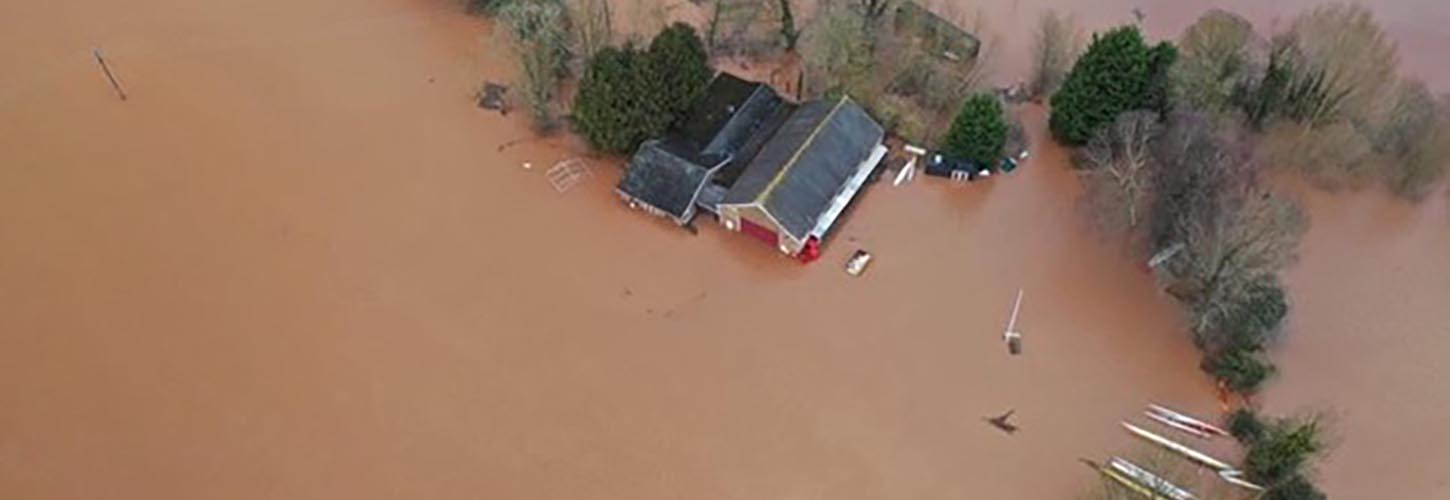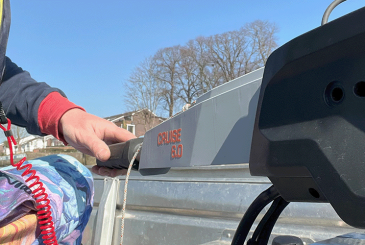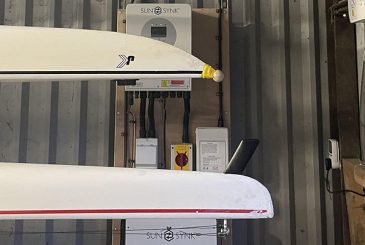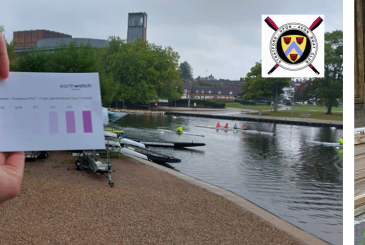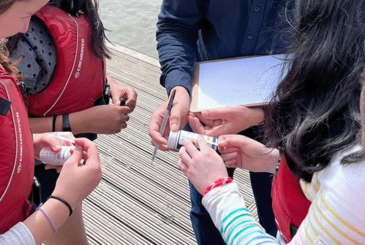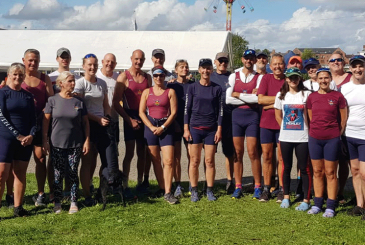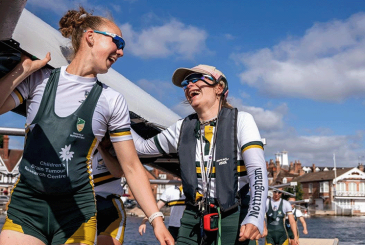British Rowing’s Facilities Service Co-ordinator Alan Meegan, tells the extraordinary story of how Ross RC ‘built back better’ after a devastating flood, which completely destroyed the clubhouse
His case study outlines how the club’s officers, members, friends, supporters and others pulled together to work with the club’s insurers and to demolish and rebuild an upgraded replacement rowing club building. Even more impressively, they achieved this while fundraising and working through the Covid pandemic and its consequences on building contractors and the national shortage of materials.
About Ross RC
Ross-on-Wye is a beautiful market town in Herefordshire. Ross RC is situated just outside the town centre. Many in the rowing community have enjoyed spending their August Bank Holiday weekend racing or spectating at Ross Regatta, while camping or caravanning on the club’s adjacent field, which provides visitors with splendid and relaxing accommodation in a truly picturesque setting.
With these idyllic settings come strict Planning Conditions, however. In this riverside situation, the buildings can only be single storey, and unlike many of rowing clubs, which have ‘clubhouse’ facilities above a ground floor boat house, Ross RC is restricted to ground floor buildings only.
As with most rowing clubs that are built at or near river level or on flood plains, the club is at risk from flooding, but until recently, the flooding has been relatively minor.
Planning clubhouse upgrades after the first flood
This story begins on 27 October 2019, while Ross RC was competing at the Gloucester Head of the River Race. The River Wye flooded and water came into the clubhouse. At this point, it didn’t flood the boathouse, though.
The club immediately contacted British Rowing Facilities, who were on hand throughout to give guidance. They also tried to provide a degree of motivation because major capital builds are inevitably long and arduous for the volunteer members who have to drive the project while holding the club together on an operational basis.
The Ross RC clubhouse was built by its members in 1977 and has a structural timber frame. This needed to dry out after the initial flooding of the building. The bar stock was also damaged, and as the club was insured with NFU, a claim process was started.
The Insurance Loss Adjuster suggested that if the club wanted to make changes to the clubhouse, now would be the time to do it. Plans were drawn up with the help of Brenda Poynton, a former junior parent and interior designer specialising in hotel refurbishments. Changes included a larger kitchen, a shower cubicle and changing facilities, a reconfigured gym and an ergo area.
As flood defence would be impossible it was decided to make the building as flood resilient as possible.
In the meantime, continuity was enabled by local businesses, who helped by storing all the club’s belongings, and Haigh Engineering, who allowed the club to set up land training facilities in a vacant industrial unit.
At this point, club members started stripping out clubhouse ready for the rebuild to start.
Temporary measures
In February 2020, another setback occurred. While waiting for plans to be approved by the Council’s Building Control, the River Wye flooded again, but this time 90cm higher than the earlier flood. Boats on the lower racks were damaged.
And then, of course, in March 2020, the Covid pandemic meant that the club had to be shut down and all activity ceased at a critical time in the restoration project.
In May 2020 the club spent £10,000 to provide an ablution block and shower trailer for members and campers to allow the club to reopen as soon as Covid regulations eased.

To assist with club revenue, the club opened an outdoor bar when pubs and clubs were allowed to open beer gardens. This was well supported, and it proved to be very successful, providing revenue and social interaction.


The cancellation of Ross Regatta in August 2020 removed the club’s main fundraising event of the year. However, camping proved to be a revenue generator as the UK went on staycations.
Slow progress
Work on the rebuild restarted, but very slowly. While waiting for the builders, club members refurbished the boathouse front.
Additional work was found in October 2020, as the corridor roof was found to be structurally damaged and needed replacing.

In January 2021, the Clubhouse flooded again, causing even further work and delays. This meant that the deadline of June 2021 for the rebuild to be completed had to be put back.
In August 2021, the Club was able to hold Ross Regatta on a reduced capacity basis, without the benefit of a clubhouse.
By February 2022, work started on new disabled access and front entrance. This was delayed again, as river flooded for a fourth time. Thankfully, the water stopped rising just 4cm short of the clubhouse, but the bar marquee blew away in the storms. A generous grant from Sport England funded the repairs.
The Clubhouse finally reopened on 4 June 2022, 31 months after the first flood!
Ross Regatta 2022 was scheduled to take place over the August bank holiday. The schedule included dragon boat racing on the Saturday, junior and masters racing on the Sunday, and an open regatta on the Monday. Camping was to be available for all. Ironically, nature dealt another bitter blow and the drought removed the rowable water, forcing cancellation yet again.
However, in the positive manner that has driven the club’s recovery Ross RC held a celebration lunch and presentation to thank the club’s sponsors, British Rowing and friends of the club during the bank holiday weekend.




Flood resilience
The clubhouse has been made flood resilient as it has too many openings to be flood resistant.
- The floor surfaces are tiled (with tile or aluminium skirting) or rubber gym matting that can be easily cleaned and would dry out quickly.
- The kitchen and bar are made of stainless steel and all kitchen units are freestanding so they can be easily moved and cleaned.
- Timber frames and plasterboard have been replaced with block work and render where possible. Other walls have marine ply panels some of which are removable to allow timbers behind to dry.
- Wall insulation is the solid type which does not absorb water.
- The gas tank has barriers either side so it can rise up in the flood but not float away off its base.
How well do these measures work?
The first time these measures were tested was during the floods of early January 2024 when water came in to a depth of about 30mm in the boathouse and ground floor land training area and bar. Once the water had gone down, ‘all’ that club members had to do was clean out the area.
“In clearing up we benefited from being able to start before silt had had a chance to dry!”
They used dehumidifiers to dry out the rubber gym flooring rather than lifting it.
The club reported, “Very little silt came into the clubhouse and we believe this was because the terrace in front of the doors ‘filters’ most of the silt out before it came into the club.” This made cleaning a lot easier.
“To clear our car park of silt we now use a 2” submersible pump attached to an old Fire and Rescue Service hose to wash the silt back into the river. Much more effective than a jet washer!”
The club is now considering fitting a submersible pump into their cellar (which is two feet lower that the rest of the building) so water can be removed more quickly from the building, and also stocking up on inexpensive disposable flood barriers to use across external door to reduce the amount of silt that gets in.
Thanks and acknowledgements
Thanks to the NFU, the club has been totally rewired and re-plumbed with a new heating system.
In addition to the insurers and other external assistance by British Rowing Facilities and Sport England, the club thanks and acknowledges local businesses who provided a training area, storage facilities and transport.
Nigel and Rosie Shepherd also deserve thanks for funding the new disabled access and entrance.
Key club members in the project include:
- Tim Ball, club Treasurer, managed the cash flow of the club and allowed for a considerable overspend on the original refurbishment budget.
- Debbie Pope managed the camping and its revenue contribution.
- Dave Rosser kept the bar running out of a 20’ container.
- Annie Scott kept members informed via the club newsletter. Annie sadly had a heart attack and died while visiting family in Texas just before the opening.
- The Club Captains kept rowing going with makeshift facilities.
- Torsten Pope was awarded a Life Membership at the Club Reopening in recognition of his role in leading what turned out to be a £500,000 project.
Funding
Since the first flood, Ross RC members have provided a huge amount of practical help with club improvement work. They have also raised considerable funds by running camping, an outdoor bar and BBQ, and a charity shop. These activities have kept the club solvent and paid for the considerable improvements that were not funded by the insurance claim.
The club received a Sport England grant of £75,000 that is going towards:
- Rebuild of the boating steps once planning permission is obtained.
- Connection to mains sewerage – sponsored by Haigh Group, a £60k project (started end June 2022).
- Construction of an overflow carpark, a £30k project (started in July 2022).
A final note from British Rowing Facilities
British Rowing Facilities has been privileged to be involved in the various aspects of the rebuild work and encourages any club involved in capital build works to seek our guidance as early as possible. Special thanks go to Torsten Pope for communicating regularly throughout the project.
We congratulate Ross RC on this remarkable recovery and on its innovative design to minimise future flood damage. We wish them well for the future!
NB The damage at Ross RC was sudden, unexpected and unavoidable. If your club is at risk from flooding, here are some tips that can help you prepare.
What do YOU want to read about on British Rowing Plus?
What do you find interesting here on British Rowing Plus that you’d like more of? What haven’t we covered yet that you’d like to read about?
Let us know by emailing [email protected]


